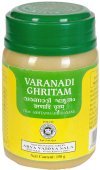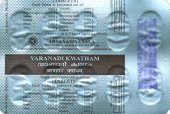Morata, Moraṭa, Moraṭā: 12 definitions
Introduction:
Morata means something in Hinduism, Sanskrit, biology. If you want to know the exact meaning, history, etymology or English translation of this term then check out the descriptions on this page. Add your comment or reference to a book if you want to contribute to this summary article.
In Hinduism
Ayurveda (science of life)
Nighantu (Synonyms and Characteristics of Drugs and technical terms)
Source: WorldCat: Rāj nighaṇṭu1) Moraṭā (मोरटा) is another name for Mūrvā, a medicinal plant identified with Marsdenia tenacissima from the Asclepiadoideae or “milkweed family” of flowering plants, according to verse 3.19-21 of the 13th-century Raj Nighantu or Rājanighaṇṭu. The third chapter (guḍūcyādi-varga) of this book contains climbers and creepers (vīrudh). Together with the names Moraṭā and Mūrvā, there are a total of twenty-eight Sanskrit synonyms identified for this plant.
2) Moraṭā (मोरटा) is also mentioned separately as a medicinal plant in verse 3.92-93. Notes: Moraṭa is identified variously as either a) the root of the sugercane (Ikṣumūla), b) Aṅkolapuṣpā (Alangium lamarckii), c) Hastikarṇa-Palāśā or as a synonym of Mūrvā (both identified as Leea macrophylla), d) Maerua arenaria, e) Moīhar (Maerua arenaria).
Moraṭa is here mentioned as having eight synonyms: Kīrṇapuṣpa, Pīlupatra, Madhusrava, Ghanamūla, Dīrghamūla, Puruṣa and Kṣīramoraṭa.
Properties and characteristics: “Moraṭa contains a milky latex and is sweet and astringent. It quells pitta-doṣa, burning sensations and fevers. It is aphrodisiac and a promoter of strength (tonic)”.
Unclassified Ayurveda definitions
Source: archive.org: Vagbhata’s Ashtanga Hridaya Samhita (first 5 chapters)Moraṭa (मोरट) is another spelling for Moraṇa (“late beestings”), as mentioned in verse 5.41 of the Aṣṭāṅgahṛdayasaṃhitā (Sūtrasthāna) by Vāgbhaṭa.—Moraṇa (“late beestings”) (v.l. moraṭa) is “that after seven days as long as it does not pass into clearness” (tad eva saptāhāt parato yāvat prasannatāṃ na gacchati tāvat). By the “passing into clearness” must probably be understood the disappearance of the so-called colostrum globules or Donne corpuscles, which takes place in the third week after parturition; Hilgenberg & Kirfel, however, refer it to the cow’s restitution to ritual purity. (cf., pīyūṣa, “early beestings”)

Āyurveda (आयुर्वेद, ayurveda) is a branch of Indian science dealing with medicine, herbalism, taxology, anatomy, surgery, alchemy and related topics. Traditional practice of Āyurveda in ancient India dates back to at least the first millenium BC. Literature is commonly written in Sanskrit using various poetic metres.
Biology (plants and animals)
Source: Wisdom Library: Local Names of Plants and DrugsMorata [मोरटा] in the Sanskrit language is the name of a plant identified with Clematis heynei M.A.Rau & al. from the Ranunculaceae (Buttercup) family having the following synonyms: Clematis triloba. For the possible medicinal usage of morata, you can check this page for potential sources and references, although be aware that any some or none of the side-effects may not be mentioned here, wether they be harmful or beneficial to health.
Morata in the Sanskrit language is the name of a plant identified with Chonemorpha fragrans (Moon) Alston from the Apocynaceae (Oleander) family having the following synonyms: Chonemorpha grandiflora, Echites fragrans, Chonemorpha elliptica.
Morata [मोरटा] in the Sanskrit language is the name of a plant identified with Clematis gouriana Roxb. ex DC. from the Ranunculaceae (Buttercup) family having the following synonyms: Clematis indica, Clematis cana, Clematis simplicifolia, Clematis martini.
Morata [मोरटा] in the Sanskrit language is the name of a plant identified with Marsdenia tenacissima (Roxb.) Moon from the Apocynaceae (Oleander) family having the following synonyms: Asclepias tenacissima, Pergularia tenacissima.
Morata [मोरटा] in the Sanskrit language is the name of a plant identified with Marsdenia volubilis (L. fil.) Cooke from the Apocynaceae (Oleander) family having the following synonyms: Asclepias volubilis, Dregea volubilis, Wattakaka volubilis.
Source: Google Books: CRC World Dictionary (Regional names)1) Morata in India is the name of a plant defined with Alangium salviifolium in various botanical sources. This page contains potential references in Ayurveda, modern medicine, and other folk traditions or local practices It has the synonym Karangolum mohillae (Tul.) Kuntze (among others).
2) Morata is also identified with Caesalpinia crista It has the synonym Genista scandens Lour. (etc.).
3) Morata is also identified with Chonemorpha fragrans It has the synonym Epichysianthus macrophyllus (G. Don) Voigt (etc.).
4) Morata is also identified with Clematis gouriana It has the synonym Clematis vitalba var. gouriana (Roxb. ex DC.) Finet & Gagnep. (etc.).
5) Morata is also identified with Clematis triloba It has the synonym Clematis triloba B. Heyne.
6) Morata is also identified with Leea macrophylla It has the synonym Ampelocissus sikkimensis auct. non (M.A. Lawson) Planch. (etc.).
Example references for further research on medicinal uses or toxicity (see latin names for full list):
· Bulletin de l’Académie Internationale de Géographie, Botanique (1902)
· Numer. List (6821)
· A General History of the Dichlamydeous Plants (1837)
· Contr. Apocyn. (1905)
· Hortus Bengalensis, or ‘a Catalogue of the Plants Growing in the Hounourable East India Company's Botanical Garden at Calcutta’ (1814)
· Transactions of the Linnean Society of London (1846)
If you are looking for specific details regarding Morata, for example chemical composition, health benefits, side effects, extract dosage, diet and recipes, pregnancy safety, have a look at these references.

This sections includes definitions from the five kingdoms of living things: Animals, Plants, Fungi, Protists and Monera. It will include both the official binomial nomenclature (scientific names usually in Latin) as well as regional spellings and variants.
Languages of India and abroad
Sanskrit dictionary
Source: DDSA: The practical Sanskrit-English dictionaryMoraṭa (मोरट).—[mur-aṭan]
1) A kind of plant with sweet juice.
2) The milk of a cow seven days after calving.
-ṭam 1 The root of the sugarcane.
2) The flower of the Ankoṭa tree.
-ṭā Hemp used for bow-strings (mūrbā).
Derivable forms: moraṭaḥ (मोरटः).
Source: Cologne Digital Sanskrit Dictionaries: Shabda-Sagara Sanskrit-English DictionaryMoraṭa (मोरट).—n.
(-ṭaṃ) 1. Root of sugar cane. 2. The blossom of the Alangium hexapetalum. 3. Milk of seven days standing, or when it has lost its milky nature. f.
(-ṭā) A sort of creeper, (Sanseviera zeylanica.) E. mur to surround, aff. aṭan .
Source: Cologne Digital Sanskrit Dictionaries: Cappeller Sanskrit-English DictionaryMoraṭa (मोरट).—[masculine] a kind of plant.
Source: Cologne Digital Sanskrit Dictionaries: Monier-Williams Sanskrit-English Dictionary1) Moraṭa (मोरट):—m. a species of plant with sweet juice, [cf. Lexicographers, esp. such as amarasiṃha, halāyudha, hemacandra, etc.]
2) n. the milk of a cow seven days after calving, [Suśruta] (also ‘sour buttermilk’ = moraṇa, [Bhāvaprakāśa])
3) Moraṭā (मोरटा):—[from moraṭa] f. Sanseviera Roxburghiana, [cf. Lexicographers, esp. such as amarasiṃha, halāyudha, hemacandra, etc.]
4) Moraṭa (मोरट):—n. the root of the sugar-cane, [cf. Lexicographers, esp. such as amarasiṃha, halāyudha, hemacandra, etc.]
5) the flower and root of Alangium Hexapetalum, [cf. Lexicographers, esp. such as amarasiṃha, halāyudha, hemacandra, etc.]
Source: Cologne Digital Sanskrit Dictionaries: Yates Sanskrit-English DictionaryMoraṭa (मोरट):—(ṭaḥ) 1. m. Root of sugar-cane; blossom of the Alangium; milk seven days old. f. (ṭā) A creeper.
[Sanskrit to German]
Sanskrit, also spelled संस्कृतम् (saṃskṛtam), is an ancient language of India commonly seen as the grandmother of the Indo-European language family (even English!). Closely allied with Prakrit and Pali, Sanskrit is more exhaustive in both grammar and terms and has the most extensive collection of literature in the world, greatly surpassing its sister-languages Greek and Latin.
Kannada-English dictionary
Source: Alar: Kannada-English corpusMoraṭa (ಮೊರಟ):—
1) [noun] a man with knotty and twisted limbs.
2) [noun] a man lacking civil or social manners, politeness.
--- OR ---
Mōraṭa (ಮೋರಟ):—[noun] = ಮೋರಟೆ [morate].
Kannada is a Dravidian language (as opposed to the Indo-European language family) mainly spoken in the southwestern region of India.
See also (Relevant definitions)
Starts with: Morataka, Moratakhala, Moratandi.
Ends with: Kalanchoe marmorata, Kshiramorata.
Full-text: Kshiramorata, Hastiparni, Ghanamula, Morana, Ghanarasa, Morada, Kirnapushpa, Dirghamula, Purusha, Pilupatra, Marotam, Karnapushpa, Morataka, Shitadru, Murva, Varunadi, Sudala, Madhusrava.
Relevant text
Search found 8 books and stories containing Morata, Moraṭa, Moraṭā, Mōraṭa, Mōṟaṭa; (plurals include: Moratas, Moraṭas, Moraṭās, Mōraṭas, Mōṟaṭas). You can also click to the full overview containing English textual excerpts. Below are direct links for the most relevant articles:
Kautilya Arthashastra (by R. Shamasastry)
Chapter 25 - The Superintendent of Liquor < [Book 2 - The duties of Government Superintendents]
Rasa Jala Nidhi, vol 3: Metals, Gems and other substances (by Bhudeb Mookerjee)
Part 5 - Use of garnet in place of diamond < [Chapter XX - Gems (8): Vaikranta (garnet)]
Atharvaveda and Charaka Samhita (by Laxmi Maji)
Classification of Drugs in the Caraka-Saṃhitā < [Chapter 4 - Diseases and Remedial measures (described in Caraka-saṃhitā)]
Amarakoshodghatana of Kshirasvamin (study) (by A. Yamuna Devi)
Economics (3): Goods of trade < [Chapter 3 - Social Aspects]
Sushruta Samhita, volume 1: Sutrasthana (by Kaviraj Kunja Lal Bhishagratna)
The Agni Purana (by N. Gangadharan)
Related products



